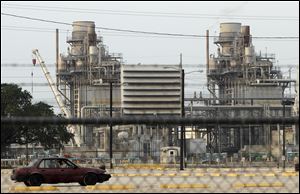
Marathon buys Texas refinery, pipelines for $1.8B
10/9/2012
A car enters an employee parking lot at BPs Texas City refinery in Texas City, Texas. BP announced that it has found a buyer for its Texas City refinery, one of the largest and most complex in the U.S.
Corrected version: Changed the production volume at the Texas refinery.
FINDLAY — Marathon Petroleum Corp. is buying a huge Texas refinery from BP PLC as part of a deal estimated at about $1.8 billion.
The Findlay-based company will pay $598 million for BP’s Texas City refinery and nearby pipelines and fuel terminals. It will pay an additional $1.2 billion for the plant’s inventory of oil and petroleum products.
The details of the sale were announced Monday. Executives said the purchase and sale agreement had not been filed with the U.S. Securities and Exchange Commission because of the Columbus Day holiday. The agreement was expected to be filed this week.
Texas City is on Galveston Bay, about 40 miles southeast of Houston.
The refinery, which processes more than 450,000 barrels of oil a day, is one of the largest and most complex in the world. It is the fifth-largest in the United States.
The sale includes more than 100 miles of liquefied-natural-gas pipelines, four light-product terminals, and supply contracts with about 1,200 BP service stations. Details on the future of the service stations were not available.
Gary Heminger, Marathon’s chief executive, has said consistently the company was interested in acquisitions like this one, which includes assets beyond just a refinery.
The sale is being financed with cash on hand. It will allow Marathon Petroleum to pass BP and become the fourth-largest refiner in the United States.
The deal fits with Marathon’s plan to expand and with the crude-oil dynamics in North America, said C. Michael Palmer, Marathon’s senior vice president of supply, distribution, and planning. “This is a big plant that has a very diverse supply of crude oils today,” he said. “It has a lot of flexibility to bring crudes in from domestic and foreign sources.”
The refinery was the site of an explosion in March, 2005, that killed 15 workers and injured more than 170. BP was found in the aftermath to have violated environmental laws.
The company has paid more than $2 billion to settle lawsuits and fines stemming from the explosion. It also has spent more than $1 billion on safety and infrastructure improvements plus $500 million to make fixes under a 2010 agreement with the Occupational Safety and Health Administration.
BP will be responsible for the fines, penalties, and other infractions tied to its ownership. The same applies to pending litigation and claims brought against the refinery.
“The plant is a very different place than it was in 2005,” said Richard Bedell, Marathon’s senior vice president for refining. “BP has gone through a significant refurbishment of the plant and reconfiguration, but also has really worked to instill a safety culture in that refinery in all aspects.”
Based on past sales of other large refineries, BP was expected to get more for this facility.
“Marathon is picking this up for a song,” Gianna Bern, president of risk-management consultant Brookshire Advisory and Research Inc. in Chicago, said in a telephone interview.
Marathon Petroleum said it expects the refinery to immediately boost its profit, reaping $700 million to $1.2 billion before interest, taxes, depreciation, and amortization. Marathon already owns an 81,500 barrel-a-day refinery in Texas City.
Marathon Petroleum’s shares closed at $57.92 Monday, up 5.6 percent. BP PLC shares were up 11 cents to $42.26.
BP been trying to sell refining and other assets to help cover costs associated with the 2010 Deepwater Horizon explosion and oil spill in the Gulf of Mexico. Since 2010, BP has agreed to sell $35 billion worth of assets, and the company expects that to rise to $38 billion by next year.
The Texas City refinery’s size, complexity, and difficult past made it tough for BP to find buyers. That allowed Marathon to increase its refinery capacity by almost 40 percent at a very good price, according to Fadel Gheit, an analyst at Oppenheimer & Co.
“It’s like selling a used car to a college kid. They are thrilled to have it and you are glad to get rid of it,” he said. Mr. Gheit said the refinery has been a “money pit” for BP. He expects Marathon Petroleum to do a better job running the plant because refining is its main business.
Marathon Petroleum was created in July, 2011, after being spun off by Marathon Oil Co. of Houston, which now focuses on oil and gas exploration and drilling.
The Blade’s news services contributed to this report.
Contact Kris Turner at: kturner@theblade.com, or 419-724-6103.